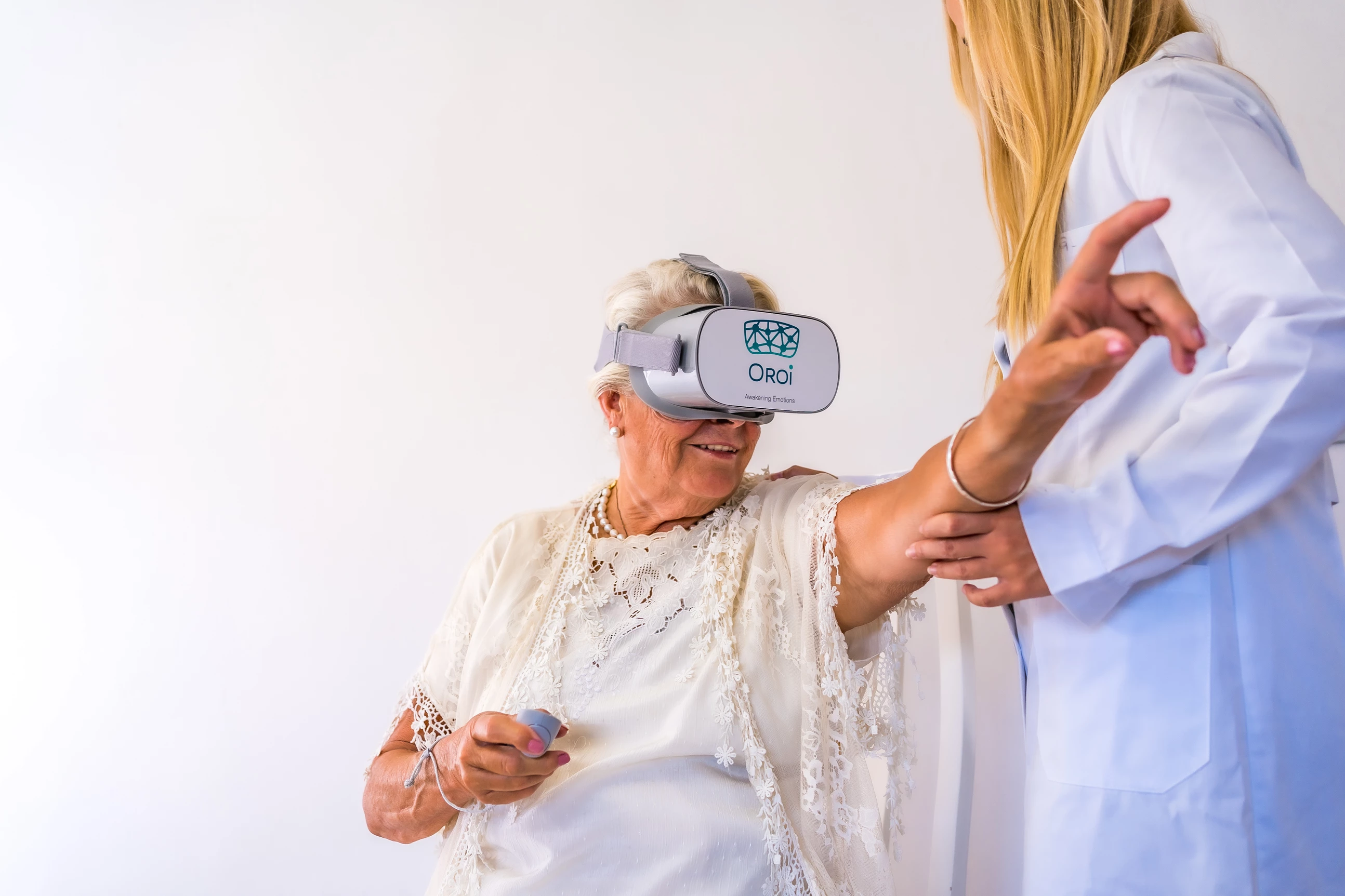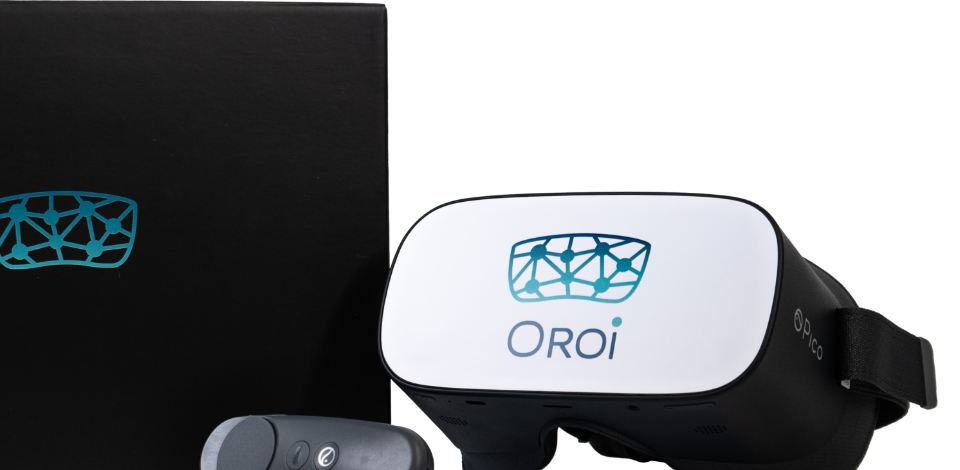News
Virtual Reality as a tool for cognitive stimulation
Adriana Gómez - - 5 Min.
One of the most common repercussions of ageing is the presence of cognitive deficits, which interfere with the performance of complex activities. Older people are at high risk of suffering from any disease that has an impact on the state of their cognition, and this risk is increased when environmental conditions are poorly stimulating [1]. Hence the importance of providing cognitive stimulation that is as tailored as possible to the needs of the individual. Current cognitive stimulation practice tends to be directed towards isolated cognitive domains including attention, executive functions, memory, language, etc. And while there is evidence for the efficacy of current methods, there is concern about the effectiveness with which the improvement of these skills is generalised, leading to sustained improvement in daily functioning [2].

Virtual Reality as a tool for cognitive stimulation
One of the major benefits of Virtual Reality is that it outperforms computer-based cognitive training by providing users with an immersive, safe and ecologically valid intervention [3,4]. Virtual environments invite the implementation of tasks that are representative of real-world demands as tasks can be constructed that will not only incorporate realistic contexts, but also elicit functional responses [5].
In this way, virtual reality facilitates self-training and overlearning [6], while involving active learning and can provide meaningful tasks that involve the perception-action feedback loop to encourage the transfer of knowledge and reasoning from a virtual world to the real world [7].
Due to these improvements over other techniques used to perform cognitive stimulation, it has been shown that the use of Virtual Reality, especially in cognitive functions such as attention [8,9], executive functions [10] and memory (visual [10], verbal [10] and episodic [11]), leads to more consistent improvements [10,12,13,14].
At the same time, improvements have been found in abstract reasoning [11], visuospatial ability [15], working memory [16], and even a reduction in both depressive symptoms [11] and behavioural disturbance [11].
As well as improvements in functions such as theory of mind and emotion recognition, in addition to social and occupational functioning [17].
If we focus on older people, we see that users with dementia show improvements in cognitive functions in general, especially in verbal fluency, visual attention [18] and different aspects of memory [19], such as autobiographical memory [20] and memory strategy implementation [21].
Therefore, we have seen that virtual reality works in a more ecological and efficient way the different cognitive functions, thus achieving a better and more lasting result in those users in whom it is applied. This makes it a tool to be taken into account when structuring cognitive stimulation sessions to be carried out.
References
-
Madrigal, L. M. J. (2007). La estimulación cognitiva en personas adultas mayores. Revista cúpula, 4-14.
-
Faria, A.L., Andrade, A., Soares, L., Bermúdez i Badía, S. (2016). Benefits of virtual reality based cognitive rehabilitation through stimulated activities of daily living: a randomized controlled trial with stroke patients. Journal of NeuroEngineering and Rehabilitation, 13(1). doi: 10.1186/s12984-016-0204-z
-
Díaz, E., Flórez-Lozano, J. (2018). Realidad virtual y demencia. Revista de Neurología 66(10): 344-352.
-
García-Betances, R.I., Arredondo, M.T., Fico, G., Cabrera-Umpiérrez, M.F. (2015). A succint overview of virtual reality technology use in Alzheimer’s disease. Frontiers in Aging Neuroscience 7(80). doi: 10.3389/fnagi.2015.00080
-
Trepagnier, C.G., (1999). Virtual environments for the investigation and rehabilitation of cognitive and perceptual impairments. NeuroRehabilitation, 12: 63-72.
-
Gómez, M. (2013). Aplicación de la realidad virtual en la rehabilitación cognitiva. RevistaVínculos, 10(1): 130-135.
-
Foloppe, D.A., Richard, P., Yamaguchi, T., Etcharry-Bouyx, F., Allain, P. (2015). The potential of virtual reality-based training to enhance the functional autonomy of Alzheimer’s disease patients in cooking activities: A single case study. Neuropsychological rehabilitation, 28(5): 709-33. doi: 10.1080/09602011.2015.1094394
-
Cho, B., Ku, J., Jang, D., Kim, J., Kim, I., Lee, J., Kim, S. (2002). Attention enhacement system using virtual reality and EEG biofeedback. In Proceedings IEEE Virtual Reality: 156-163.
-
Gagnon, L.G., Belleville, S. (2012). Training of attentional control in mild cognitive impairment with executive deficits: Results from a double-blind randomized controlled study. Neuropsychological rehabilitation, 22(6), 809-835. doi: 10.1080/09602011.2012.691044
-
Coyle, H., Traynor, V., Solowij, N. (2015). Computerised and virtual reality cognitive training for individuals at high risk of cognitive decline: Systematic review of the literature. The American Journal of Geriatric Psychiatry, 23(4): 335-359. doi: 10.1016/j.japg.2014.04.009
-
Rozzini, L., Costardi, D., Chilovi, B.V., Franzoni, S., Trabucchi, M., Padovani, A. (2007). Efficacy of cognitive rehabilitation in patients with mild cognitive impairment treated with cholinesterase inhibitors. International Journal of Geriatric Psychiatry, 22(4): 356-360. doi: 10.1002/gps.1681
-
Kim, B. R., Chun, M. H., Kim, L. S., & Park, J. Y. (2011). Effect of virtual reality on cognition in stroke patients. Annals of rehabilitation medicine, 35(4), 450.
-
Eng, K., Siekierka, E., Cameirao, M., Zimmerli, L., Pyk, P., Duff, A., Erol, F., Schuster, C., Bassetti, C., Kiper, D., Verschure, P. (2007). Cognitive virtual-reality based stroke rehabilitation. In World Congress on Medical Physics and Biomedical Engineering: 2839-2843.
-
Kizony, R., Katz, N., & Weiss, P. L. (2004). Virtual reality based intervention in rehabilitation: relationship between motor and cognitive abilities and performance within virtual environments for patients with stroke. In Proceedings of the 5th international conference on disability, virtual reality and associated technology. Oxford, UK
-
Barnes, D.E., Yaffe, K., Belfor, N., Jagust, W.J., DeCarli, C., Reed, B.R. y Kramer, J.H. (2009). Computer-based cognitive training for mild cognitive impairment. Alzheimer disease & Associated Disorders, 23(3): 205-210. doi: 10.1097/wad.0b013e31819c6137
-
Rosen, A.C., Sugiura, L., Kramer, J.H., Whitfield-Gabrieli, S., Gabrieli, J.D. (2011). Cognitive Training Changes Hippocampal Function in Mild Cognitive Impairment: A pilot study. Journal of Alzheimer’s disease, 26(3): 349-357. doi: 10.3233/jad-2011-0009
-
Kandalaft, M.R., Didehbani, N., Krawczyk, D.C., Allen, T.T., Chapman, S.B. (2013). Virtual reality social cognition training for young adults with high-functioning autism. Journal of Autism and Developmental Disorders, 43(1): 34-44.
-
Cipriani, G., Bianchetti, A., Trabucchi, M. (2006). Outcomes of a computer-based cognitive rehabilitation program on Alzheimer’s disease patients compared with those on patients affected by mild cognitive impairment. Archives of Gerontoloy and Geriatrics, 43(3): 327-335. doi: 10.1016/j.archger.2005.12.003
-
Optale, G., Urgesi, C., Busato, V., Marin, S., Piron, L., Prifits, K., Gamberini, L., Capodeci, S., Bordin, A. (2009). Controlling memory impairment in elderly adults using virtual reality memory training: a randomized controlled pilot study. Neurorehabilitation and Neural Repair, 24(4): 348-357. doi: 10.1177/1545968309353328
-
Benoit, M., Guerchouche, R., Petit, P.D., Chapoulie, E., Manera, V., Chaurasia, G., Drettakis, G., Robert, P. (2015). Is it possible to use highly realistic virtual reality in the elderly? A feasibility study with image-based rendering. Neuropsychiatric Disease and Treatment, 557-563. doi: 10.2147/ndt.s73179
-
Man, D.W.K., Chung, J.C.C., Lee, G.Y.Y. (2011). Evaluation of a virtual reality-based memory training programme for Hong Kong Chinese older adults with questionable dementia: a pilot study. International Journal of Geriatric Psychiatry, 27(5): 513-520. doi: 10.1002/gps.2746


Neuigkeiten
Das Virtual Reality Unternehmen OROI ernennt Linda Hypki zur Direktorin für Marketing und Vertrieb

Neuigkeiten
Der Einsatz fing bei Computerspielen und Co. an und ist nun fester Bestandteil in der Pflege - VR

